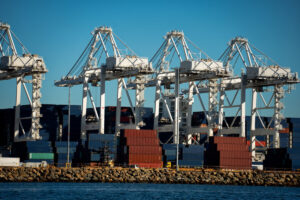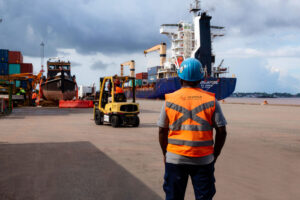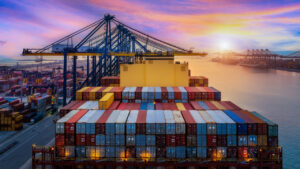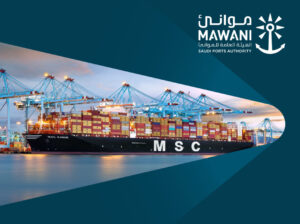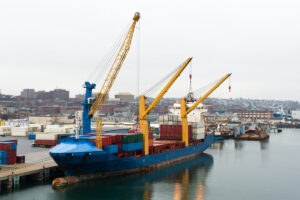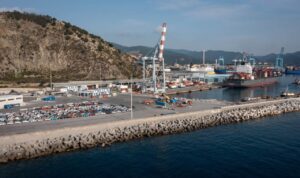The Port of Barcelona is among a number of ports that are seeking to digitally transform into a leading smart port and its effort to do so the Port is set to bring the live-streamed Smart Ports: Piers of the Future event to the port community on 17 and 18 November.
In partnership Port Technology International, the Port of Barcelona has been able to develop a world-class live streaming event through the Smart Ports: Piers of the Future event which seeks to keep the port community up to date on the latest trends.
Not registered yet? Make sure you register here.
Ahead of the event PTI spoke to Mercè Conesa, President at the Port of Barcelona about the Port’s involvement with the ChainPORT group, her personal highlights for the event and the importance of the virtual gathering of port leaders.
“Smart Ports: Piers of the future is key to keeping up to date with the latest technological developments and major changes that the ports of the future will undergo. Today’s world is spinning faster and faster and we need to be informed of everything that will happen in a few months. That is why events like this help us to keep a close eye on world developments,” Conesa said.
“To push forward our transformation towards a smart port we also need the involvement of the entire port community.
“A port like Barcelona is a very complex structure that brings together many different stakeholders with different needs, therefore training is crucial. People working in ports need to learn to think digitally, in other words, to make the most of the technology they have available. That is why the Port of Barcelona invests in training people, because the success of digital transformation lies in a corporate culture that promotes innovation and creativity.”
Working with the ChainPORT group
With at least seven ports contributing to the event via the ChainPORT group Conesa explained the importance of the ports and their top leadership being part of the event.
“It is important to establish a global chain of smart ports that are leading the development and implementation of technological solutions to share knowledge, create a basis for the joint development of innovative future-oriented solutions and develop common strategies for the port sector, which is the case of ChainPORT,” Conesa said.
“Smart Ports: Piers of the future is the ideal setting for exchanging these ideas, projects and initiatives. This globally significant event serves to show the importance of having a smart and digitalised port that is committed to the environment but, above all, is connected to the inhabitants of cities and the planet,” she explained.
Initiated by the Hamburg Port Authority, the ChainPORT group consists of some of the world’s leading ports including ports of Antwerp, Barcelona, Busan, Felixstowe, Hamburg, Los Angeles, Montreal, Rotterdam, Shanghai, Shenzhen and Singapore
The successes of the ChainPORT group will be discussed throughout the event specifically highlighting their work together to increase interconnectivity.
“By working together, all of us taking part can help to reduce fragmentation in the maritime supply chain, increasing interconnectivity. We can actively shape maritime policy by speaking with one voice to policymakers and all key stakeholders and include the port logistics community in the process of digital change through education, development and participation.
“All these key elements are included in the Smart Ports programme to provide the opportunity to decide how to be a smart port that helps industry and society to be more efficient and more sustainable,” Conesa said.
Smart ports and smart cities
She said that they key message from the Port of Barcelona during the event will focus on the smart port and the smart city.
“A smart port is a port that uses automation and innovative technologies —including artificial intelligence (AI), digitalisation, big data, the Internet of Things (IoT) and blockchain— to improve its performance. Using these tools, the Port of Barcelona has committed to a smart port model, which means evolving to become a more efficient, sustainable port with the capacity to provide continuous service,” she said.
“The smart model of the Port of Barcelona is based on the academic smart city model, which covers six different dimensions of transformation adapted to the port environment: logistics, mobility, environment, economy, people and governance. “
For Conesa one of the highlight at the event is set to be the panel session on Smart Piers Cities where Jordi Torrent (Port of Barcelona), Jens Meier (Port of Hamburg) and Gene Seroka (Port of Los Angeles) will discuss the relationship between ports and cities, now and in future, with Frank Ramirez (Office of Governor Gavin Newsom – California).
“This discussion will be very interesting because it touches on a wide variety of topics: impact on economic development, environment, jobs, mobility, tourism, etc. The future integration of Ports & Cities is crucial for cities like Barcelona, Hamburg and LA, and for the whole world as well. New technologies will bring new business models and we all share a responsibility to make them sustainable,” Conesa said.
Project spotlights
Alongside the traditional presentations and panel sessions at the event there are dedicated project spotlights which will highlight how the latest technologies can be implemented in real-world scenarios.
“These projects are genuine examples of what ports are working on together with partners inside and outside our industry. These examples could help other ecosystems to understand how to face similar challenges,” Conesa said.
“In fact, for this edition of Smart Ports we have some very interesting projects presented by these seven ports, even during Covid-19 when ports have been able to deliver service in extreme conditions.
“For the Port of Barcelona, ‘Artificial Vision’ is a project which looks into the future but with very clear application today on traffic, cruises and waste.
“I also want to especially mention the ‘Chain port’ project spotlight called ‘The Digital Playbook – Leveraging digital solutions in crisis management’. The playbook highlights the best digital practices and how these have enabled ports to overcome the global challenges stemming from COVID-19 so that they could continue with their operations.
“The Playbook shows how organisations that were better prepared, digitally speaking, have reacted faster and with greater resilience to the crisis caused by COVID-19. This project will therefore be very helpful in these times and it is a clear example of open innovation: five ports learning together about overcoming a crisis and getting ready for the next one, sharing that knowledge at a public level,” Conesa concluded.
The Digital playbook is available for anyone to use on our piernext knowledge hub.


